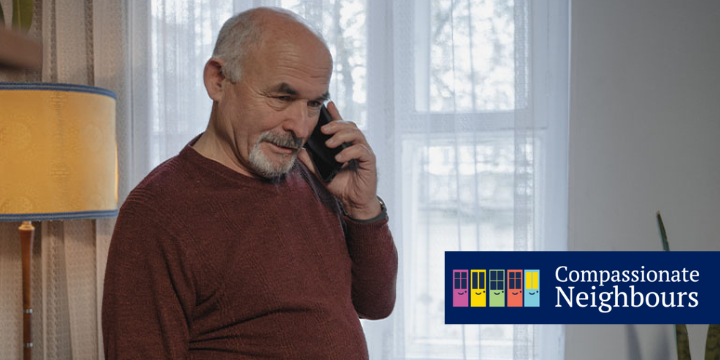Martlets is supporting Compassionate Neighbours, a nationwide project to reduce loneliness and isolation for those touched by end-of-life issues. Mark signed up to be a Compassionate Neighbour via Martlets and tells us about his experience.
“I’ve been volunteering for Martlets for just over 15 years. I’ve done all sorts of things from walking around with a collection tin to being Father Christmas in Santa’s Grotto. But for the past 12 years, I’ve mainly been visiting patients at home as a volunteer befriender. When COVID came along, we had to stop the home visits, so I transferred on to the Compassionate Neighbours scheme. It’s quite different talking to someone on the telephone, especially if you haven’t met them before. But you get used to it.
I now have three people that I’ve developed really good relationships with and we’ll chat about all sorts of stuff. One guy I talk to is a patient living on his own. He loves football and I like it too, so we talk about that. I also talk to a lady whose husband has Alzheimer’s and she’s his main carer. It can be tough being a carer. She seems to get a lot out of my calls and we talk about all sorts of stuff. Some people are easy to talk to whereas others are tricky to get a conversation going with. When I phone a new person I always go into it with an open mind. I think you’ve got to be a bit of a chameleon and fit in with their needs.
To talk and to listen
Some people love to talk and others love to listen, so you need to adapt accordingly. People living on their own often just want to talk. Some are living in very difficult circumstances and feeling very low. You look for something positive to try and lift them up a bit, but that isn’t always possible. Really, you’re there to hear whatever they need to say.
Other people are the opposite and will talk about other things going on in their lives rather than illness. They spend a lot of their time talking to health professionals and they have clinical people coming in and out. So sometimes it’s nice for them to have a chat where they don’t talk about their health. Or the health of the person they’re caring for. Often, I won’t know what the person’s diagnosis is, I’m not there to talk about their illness. I’ll only do that if they want me too. They just want to talk about lighter stuff – the football and where they’ve been shopping.
I’ve had two people who’ve needed more support so I referred them into Martlets’ services. For anything like that Elmien, who organises Compassionate Neighbours, is the central hub. One chap I was calling, who’s sadly died now, had got into such a bad way. He was very ill and living alone. When I called I realised he was struggling with basic daily tasks and at risk. I called Elmien who got on to social services and they made sure he got all the care he needed. Checking on someone isolated with a regular call allows you to pick up problems like that. So they can get the help they need as soon as possible.
Could you be a Compassionate Neighbour?
I’d say to anyone thinking of becoming a Compassionate Neighbour to contact Elmien and find out all about it. We did some training beforehand and talked amongst ourselves about what we might expect from it. We have a fortnightly get together online when we discuss any issues. We’ve had a lot of support from Elmien and can call her anytime to talk about how we’re getting on.
I’d also add that it’s important to be in the right frame of mind to make the calls. You need to set time aside rather than do it in a rushed way while you’re juggling other things. And remember that with some calls the conversation will flow but with others it might be more difficult. You might think you’re not getting anywhere, but over time the person might suddenly open up and it feels good. It’s about building that relationship which can take time. If someone’s on their own the idea that days may go by for them without human contact is terrible. Even if they don’t have much to say, your call is providing connection and they know someone cares.
I’m hoping that I’ll be able to see some of the people I’ve been chatting with in person at home. With a COVID vaccine on the way, once it’s safe to do so it’ll be great to do that. Nothing beats face-to-face visits, but right now the phone calls we’re making are a lifeline for so many people. It feels good to know I’m making a difference.”
Elmien Brink, Martlets’ Compassionate Neighbours lead, says new recruits are always welcome:
“Around 200,000 older people in the UK have not had a conversation with a friend or relative in more than a month. It’s a shocking statistic and we want to help people connect across the local community. Our Compassionate Neighbours are trained volunteers who offer friendship and emotional support to local people who may be at risk of becoming isolated. So please do get in touch if you’d like to find out more.”
Contact the Compassionate Neighbours team for more information:
- Register your interest
- Email our Compassionate Neighbours team
- Donate to Martlets
Published 18/01/2021

